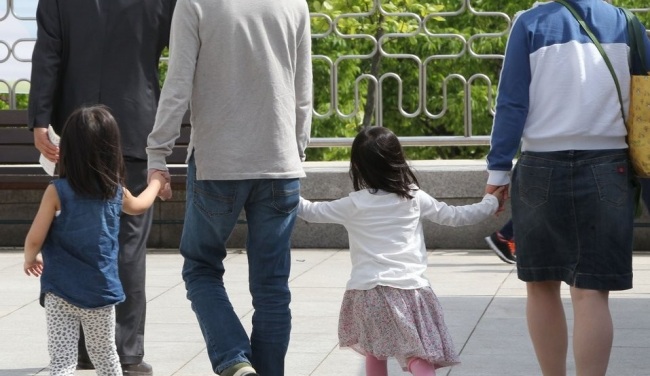South Koreans prefer girls over boys when adopting a child domestically, government data showed Monday.
According to a report by the Ministry of Health and Welfare, of the 465 Korean children adopted in the country in 2017, 68 percent were girls.
The preference for girls over boys among Korean adoptive parents has existed since the early 2000s. In 2001, 58 percent of all children adopted domestically were girls. In 2013, the proportion increased to 70 percent, and dropped slightly to 65 percent in 2016.
According to a report by the Ministry of Health and Welfare, of the 465 Korean children adopted in the country in 2017, 68 percent were girls.
The preference for girls over boys among Korean adoptive parents has existed since the early 2000s. In 2001, 58 percent of all children adopted domestically were girls. In 2013, the proportion increased to 70 percent, and dropped slightly to 65 percent in 2016.

Researchers say that the trend is connected to Koreans’ growing preference for girls over boys, regardless of the children being adopted or biologically their own.
According to a 2013 study by Seoul National University professor Eun Ki-soo, Koreans used to prefer boys over girls up until the 1990s, fanned by the belief that sons would take care of them financially during their post-retirement years.
But the notion -- that having a son guarantees one’s post-retirement welfare -- has changed dramatically after the 1997-98 Asian Financial Crisis, according to Eun’s research.
The research suggests that such expectations have gradually been replaced with a sense of burden over having sons. The burden, research suggests, arises from the lingering custom of parents providing support such as housing for sons and their spouses, despite growing changes to the gender norms.
In the context of adoption, previous reports have said Koreans prefer girls over boys as they believe daughters often offer more emotional support throughout their lives.
Overseas research suggests that it is not just Korean adoptive parents who prefer girls. In many countries, including the US, girls have been consistently preferred over boys by adoptive parents.
According to the New York-based think tank Even B. Donaldson Adoption Institute, this preference largely has to do with who usually becomes the main caregiver of the adopted children -- it’s the mothers, not fathers, and according to the think-tank, mothers want to adopt daughters.
“Parents, mostly women, who initiate adoptions do so because they want children to nurture and love, and they adopt girls out of a common perception -- however accurate or inaccurate it may be -- that girls respond better to nurturing than boys do,” said US writer John Grevois, in his 2004 article titled “Bringing up Babes: Why do adoptive parents prefer girls” for Slate magazine.
Indeed, 52. 4 percent of all Korean adoptive parents said in 2015 that they had decided to adopt because they wanted to “provide a home” and care for children in need, while only 2 percent said they were doing so to secure an heir, according to a study by the Ministry of Gender Equality.
Korea remains one of the largest sources of babies in the world, having sent more than 200,000 children overseas, mostly to the US, since the end of the Korean War (1950-53).
Almost 90 percent of all Korean adoptees sent overseas from the 1970s and onwards are born to unwed, single mothers, who remain exposed to social stigmatization.
Partially due to Korean adoptive parents’ strong preference for girls, almost 76 percent of all Korean children sent overseas for international adoption last year were boys, according to Ministry of Welfare data.
By Claire Lee (dyc@heraldcorp.com)





![[Herald Interview] 'Amid aging population, Korea to invite more young professionals from overseas'](http://res.heraldm.com/phpwas/restmb_idxmake.php?idx=644&simg=/content/image/2024/04/24/20240424050844_0.jpg&u=20240424200058)


![[Pressure points] Leggings in public: Fashion statement or social faux pas?](http://res.heraldm.com/phpwas/restmb_idxmake.php?idx=644&simg=/content/image/2024/04/23/20240423050669_0.jpg&u=)










